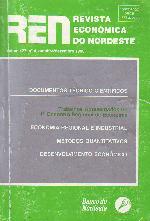MIGRAÇÕES RURAIS EM ÁREAS DE IRRIGAÇÃO PÚBLICA NO NORDESTE
DOI:
https://doi.org/10.61673/ren.1996.2137Keywords:
Rural Migration, Work Force, Curu-Paraipaba Irrigation Perimeter, Brazil-Northeastern Region-CearáAbstract
The public irrigation projects in Northeastern Brazil were established with the aim of building a productive infrastructure capable of increasing agricultural income and decreasing the flow of rural-urban migration. This study intends to verify the occurrence of out-migration flows in the Curu-Paraipaba irrigation project at Ceará State, and to examine the factors which influence migration propensity. Probit maximum likelihood method was used to estimate the empirical model. The results showed that lower income farmers migrate, influenced by the possibility of better economic returns in urban centers, and that higher income farmers are not responsive to many factors that traditionally influence migration.








